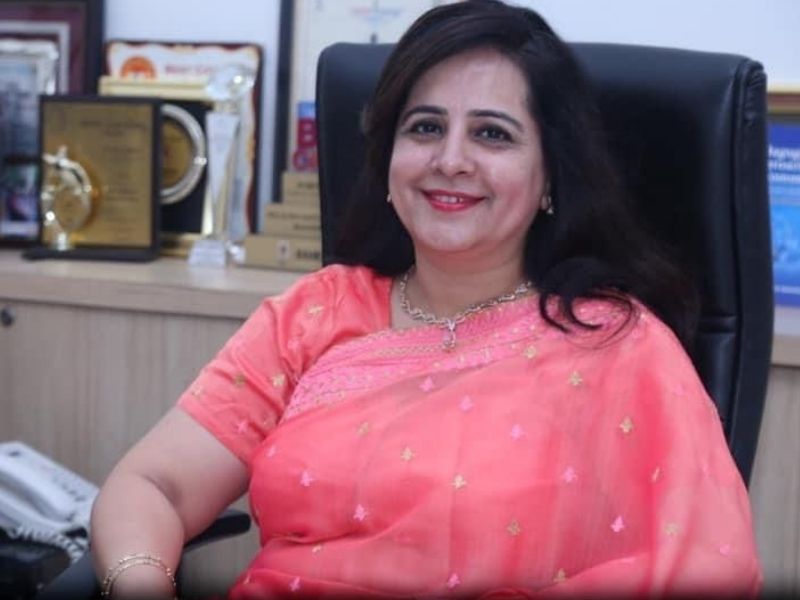RD and SH National College, Mumbai (estb.1949) is the first of the 27 institutes established by the premier educational network, the Hyderabad Sind National Collegiate Board (HSNCB) in and around Mumbai. As educational institutions in the state close due to the third wave of COVID, Dr Neha Jagtiani, principal-in-charge and National Education Policy advisor to the Maharashtra government speaks to EducationWorld’s Dipta Joshi. Dr Jagtiani outlines innovative practices to optimise online learning outcomes and the need to privatise education to improve the quality of education in the country.
Q) Based on past experience, what changes could educational institutions adopt to improve online teaching-learning?
A) Educators never took a break during the earlier COVID waves and simply shifted from ‘chalk and talk’ to ‘log and talk’. Technically online malpractices can be avoided by doing what we did – issuing unique institutional IDs to individual students and using the cloud-based ‘Google Workspace’ (formerly G-Suite) app that empowers teachers to administer online sessions.
I also suggest introducing a mentor system to sponsor digital devices for the needy to access online classes. We also need teachers to make up for the lack of personal interaction in physical classrooms. Students who are otherwise on mute need to be engaged through quizzes, Q & As and PowerPoints etc.
Q) How is prolonged online education impacting students?
A) I think the prolonged online education has impacted the mental health of students. Education is not only about sitting through lectures but about interacting with peers, participating in sports, cultural activities etc. Physical classes enable personality development. It will be sometime before COVID disappears completely, but we cannot have students losing the opportunity to build their future. Therefore, online education must be innovatively planned to get students to interact with the teacher as well as with each other.
Q) As you mentioned, COVID and its variants might prevail for some time. How can students who are missing regular education ensure they are job-ready?
A) I believe our employability quotient is very low because the industry is not involved in creation of the syllabus. Industry-academia partnerships ensure students are taught skills that make them employable. Today, most of our graduates are unemployable in the absence of the required skills.
That said, students can start working on their CV from the first year itself instead of waiting until the final year to identify and work on the missing skillsets and get employed in the career of their choice.
Some specific tips for students to boost their employability and becoming job-ready are:
– Enrolling in MOOCs (massive open online courses) on platforms such as Coursera, EdX, ClassCentral, etc.
– Gaining some work experience at the undergrad level.
-Polishing up your writing skills specially the basics of spelling and grammar.
-Cultivating a mindset geared towards finding the solutions instead of focusing on the problem. Also students should view failure as a learning experience.
-Finding a career mentor: Career mentors can provide valuable advice and insights into career options and career planning.
Q) What ails the education system in the country today?
A) With government funded education in India being subsidised, the quality of education suffers. Most students who don’t want to miss a single coaching class because they have paid for it through their nose don’t mind missing college because they feel they aren’t losing much. We need to privatise education to improve the standard of education in the country.
We also need to stop the brain drain through clearly defined policy stipulations.
Q) As an advisor to the Maharashtra state government on the National Education Policy, what were some of your suggestions?
A)I think it is important that we follow an interdisciplinary approach to education, letting students study multiple subjects before specialising in the subject of their interest. We also need to have an industry-aligned curriculum that makes students employable and make it compulsory for students to do internships while studying.
Q) You have been encouraging improved industry connect for your students too. Comment.
A)We start grooming our students early by teaching them to write a good CV, attend interviews and group discussions. We have regular seminars, workshops, and networking with industry professionals. Our annual educational career conclave “From Campus to Corporate” (for the second and third-year undergraduates) has 69 companies offering them multiple packages. Even during COVID times, we managed to place 60 percent of our students.
Q) The college has initiated many pro-student activities in the past. Did you have to scale down these activities due to COVID?
A) No, in fact, we grew from strength to strength during the lockdowns. We set up a UPSC Center to help interested students prepare for civil services exams and inaugurated the Centre for Innovation, Sustainability and Social Entrepreneurship in collaboration with the Indian Institute of Technology (IIT), Mumbai. Our virtual laboratory facilitates experiment-based learning for undergraduate students from other colleges too. We launched a pre-incubation centre to promote start-up and entrepreneurship, a medicinal plant garden with 200 varieties. We also got our entire campus Wi-fi enabled, set up a mass media studio and became the first college to have a recycling project that uses laboratory wastewater for watering the campus garden.
Posted in Campus, News























